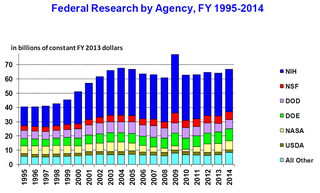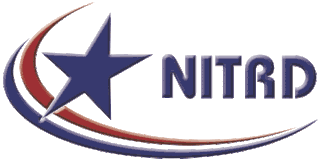In the United States government, independent agencies are agencies that exist outside the federal executive departments and the Executive Office of the President. In a narrower sense, the term refers only to those independent agencies that, while considered part of the executive branch, have regulatory or rulemaking authority and are insulated from presidential control, usually because the president's power to dismiss the agency head or a member is limited.

The Telecommunications Act of 1996 is a United States federal law enacted by the 104th United States Congress on January 3, 1996, and signed into law on February 8, 1996 by President Bill Clinton. It primarily amended Chapter 5 of Title 47 of the United States Code. The act was the first significant overhaul of United States telecommunications law in more than sixty years, amending the Communications Act of 1934, and represented a major change in that law, because it was the first time that the Internet was added to American regulation of broadcasting and telephony.

The U.S. Government Accountability Office (GAO) is an independent, nonpartisan government agency within the legislative branch that provides auditing, evaluative, and investigative services for the United States Congress. It is the supreme audit institution of the federal government of the United States. It identifies its core "mission values" as: accountability, integrity, and reliability. It is also known as the "congressional watchdog". The agency is headed by the Comptroller General of the United States. The comptroller general is appointed by the president with the advice and consent of the Senate. When a vacancy occurs in the office of the comptroller general, Congress establishes a commission to recommend individuals to the president. The commission consists of the following:

The National Telecommunications and Information Administration (NTIA) is an agency of the United States Department of Commerce that serves as the president's principal adviser on telecommunications policies pertaining to the United States' economic and technological advancement and to regulation of the telecommunications industry.

The National Medal of Technology and Innovation is an honor granted by the President of the United States to American inventors and innovators who have made significant contributions to the development of new and important technology. The award may be granted to a specific person, to a group of people or to an entire organization or corporation. It is the highest honor the United States can confer to a US citizen for achievements related to technological progress.
A cybersecurity regulation comprises directives that safeguard information technology and computer systems with the purpose of forcing companies and organizations to protect their systems and information from cyberattacks like viruses, worms, Trojan horses, phishing, denial of service (DOS) attacks, unauthorized access and control system attacks. While cybersecurity regulations aim to minimize cyber risks and enhance protection, the uncertainty arising from frequent changes or new regulations can significantly impact organizational response strategies.

The National Emergencies Act (NEA) is a United States federal law passed to end all previous national emergencies and to formalize the emergency powers of the President.

The Security and Accountability For Every Port Act of 2006 was an Act of Congress in the United States covering port security and to which an online gambling measure was added at the last moment. The House and Senate passed the conference report on September 30, 2006, and President Bush signed the Act into law on October 13, 2006.

The High Performance Computing Act of 1991 (HPCA) is an Act of Congress promulgated in the 102nd United States Congress as (Pub.L. 102–194) on December 9, 1991. Often referred to as the Gore Bill, it was created and introduced by then Senator Al Gore, and led to the development of the National Information Infrastructure and the funding of the National Research and Education Network (NREN).

The Institute of Museum and Library Services (IMLS) is an independent agency of the United States federal government established in 1996. It is the main source of federal support for libraries and museums within the United States, having the mission to advance, support, and empower America’s museums, libraries, and related organizations through grantmaking, research, and policy development.” The agency carries out its charge as it adapts to meet the changing needs of our nation’s museums and libraries and their communities. In fiscal year 2023, IMLS had a budget of $313.58 million. As of 2023, IMLS currently has 70 full-time employees, many of whom still work remotely. In 2022, the employees voted to unionize, joining hundreds of thousands of federal workers who have joined the American Federation of Government Employees (AFGE) to “build power and have a voice at work.”

Gary Charles Peters Sr. is an American lawyer, politician, and former military officer serving as the junior United States senator from Michigan since 2015. A member of the Democratic Party, he was the U.S. representative for Michigan's 14th congressional district, which included the eastern half of Detroit, the Grosse Pointes, Hamtramck, Southfield, and Pontiac, from 2009 to 2015.
The America COMPETES Act was authored by Bart Gordon and signed into law on August 9, 2007, by President George W. Bush. The act aimed to invest in innovation through research and development and improve the competitiveness of the United States.

The science policy of the United States is the responsibility of many organizations throughout the federal government. Much of the large-scale policy is made through the legislative budget process of enacting the yearly federal budget, although there are other legislative issues that directly involve science, such as energy policy, climate change, and stem cell research. Further decisions are made by the various federal agencies which spend the funds allocated by Congress, either on in-house research or by granting funds to outside organizations and researchers.

The Networking and Information Technology Research and Development (NITRD) program consists of a group of U.S. federal agencies to research and develop information technology (IT) capabilities to empower Federal missions; support U.S. science, engineering, and technology leadership; and bolster U.S. economic competitiveness.

The Arms Control and Disarmament Act of 1961, 22 U.S.C. § 2551, was created to establish a governing body for the control and reduction of apocalyptic armaments with regards to protect a world from the burdens of armaments and the scourge of war.

The Digital Accountability and Transparency Act of 2014 is a law that aims to make information on federal expenditures more easily accessible and transparent. The law requires the U.S. Department of the Treasury to establish common standards for financial data provided by all government agencies and to expand the amount of data that agencies must provide to the government website, USASpending. The goal of the law is to improve the ability of Americans to track and understand how the government is spending their tax dollars.

The Revitalize American Manufacturing and Innovation Act of 2013 is a bill that would establish the Network for Manufacturing Innovation Program (NMIP) within the National Institute of Standards and Technology (NIST). Under the program, NIST would award grants to establish a network of centers of innovation to improve the competitiveness of domestic manufacturers.
The Science and Technology Policy Institute is a federally funded research and development center located in Washington, D.C. STPI provides objective research and analysis on science and technology policy issues in support of the White House Office of Science and Technology Policy (OSTP), as well as for its sponsor, the National Science Foundation, and other science-performing federal agencies. STPI is administered by the non-profit Institute for Defense Analyses, located in Alexandria, Virginia. As of May 2020, Kristen Kulinowski is the current director of STPI.
The United States federal budget for fiscal year 2020 ran from October 1, 2019 to September 30, 2020. The government was initially funded through a series of two temporary continuing resolutions. The final funding package was passed as two consolidated spending bills in December 2019, the Consolidated Appropriations Act, 2020 and the Further Consolidated Appropriations Act, 2020. A series of supplemental appropriations bills were passed beginning in March 2020 in response to the COVID-19 pandemic.

Spark M. Matsunaga Hydrogen Research, Development, and Demonstration Act of 1990 is a United States statute establishing a comprehensive five year management program for the domestic distribution, production, and utilization of the lighter than air and diatomic molecule known as hydrogen. The Act of Congress endorsed the development and research of renewable energy and renewable resources for hydrogen production. The United States public law standardized the energy carrier as a critical technology declaring the period 1 element for the expansion of a hydrogen economy within the continental United States.








